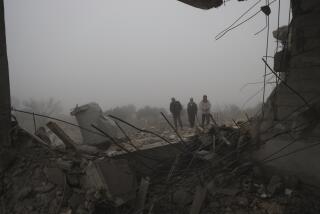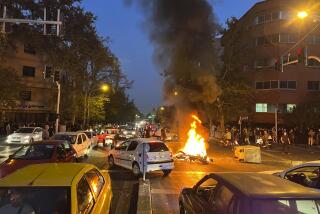Britain Recalls Iraqi Ambassador in Response to Execution : Diplomacy: London also halts ministerial contacts. Thatcher calls the hanging of journalist ‘barbaric.’
- Share via
LONDON — Britain on Thursday recalled its ambassador from Iraq and halted ministerial contacts with the government of President Saddam Hussein to protest Baghdad’s hanging of a London-based journalist it accused of spying.
“Thatcher wanted him alive. We sent him in a box,” Information Minister Latif Nassayif Jassim said in breaking the news of the Thursday morning execution in Baghdad.
British Prime Minister Margaret Thatcher had led the campaign to repeal the death sentence imposed on 32-year-old Farzad Bazoft. Bazoft was working for The Observer, a British weekly, investigating reports of an explosion at an Iraqi military facility when he was arrested.
Iraq alleged that Bazoft had spied for Israel and Britain, charges that Bazoft and his colleagues denied.
“It is an awful day for the newspaper,” said Observer Editor Donald Trelford. “We have had one of our number killed for simply being a reporter.”
Trelford and about 200 journalists held a vigil outside the heavily guarded Iraqi Embassy here until word of Bazoft’s execution broke. Journalists left a single candle burning in Bazoft’s memory in St. Bride’s Church, Fleet Street, London’s former newspaper row.
Hussein had said repeatedly that his country did not fear Britain’s anger in executing the journalist, and the information minister repeated this after the execution.
“It seems the British could not understand our psychology that we are not intimidated,” Jassim said.
Thatcher said: “This is a very, very grave and serious matter. The Iraqi government’s action is an act of barbarism which is deeply repugnant to all civilized people.”
Foreign Secretary Douglas Hurd announced that Ambassador Harold Walker is being recalled from the Iraqi capital. Hurd called off a trade mission to Iraq and said all ministerial visits have been halted.
Hurd also said that all six Iraqi military trainees in Britain are being ordered to leave the country. But he said that trade sanctions would likely harm Britain and “not alter the stance of this regime” in Iraq, so there were no plans to implement them.
Britain has a trade surplus of about $648 million with Iraq.
In Washington, the Bush Administration expressed regret Thursday but did not join the strong condemnation of the execution.
Bazoft, an Iranian-born journalist, was detained in September near a military industrial complex south of Baghdad. He was investigating reports that hundreds of people had died in an explosion at the complex in August.
A British nurse, Daphne Parish, 52, was convicted on charges that she drove Bazoft to the Al Iskandaria military complex and was sentenced to 15 years in prison.
Robin Kealy, the British general consul in Baghdad, visited Bazoft shortly before his hanging at the Abu Ghraib prison in Baghdad.
In a British Broadcasting Corp. interview, Kealy said Bazoft looked “hollow-eyed and subdued” and repeated that he was not a spy.
Bazoft, a stateless Iranian, was the son of an Iranian National Oil Co. manager. He never returned to Iran after moving to Britain as a teen-ager.
More to Read
Sign up for Essential California
The most important California stories and recommendations in your inbox every morning.
You may occasionally receive promotional content from the Los Angeles Times.













